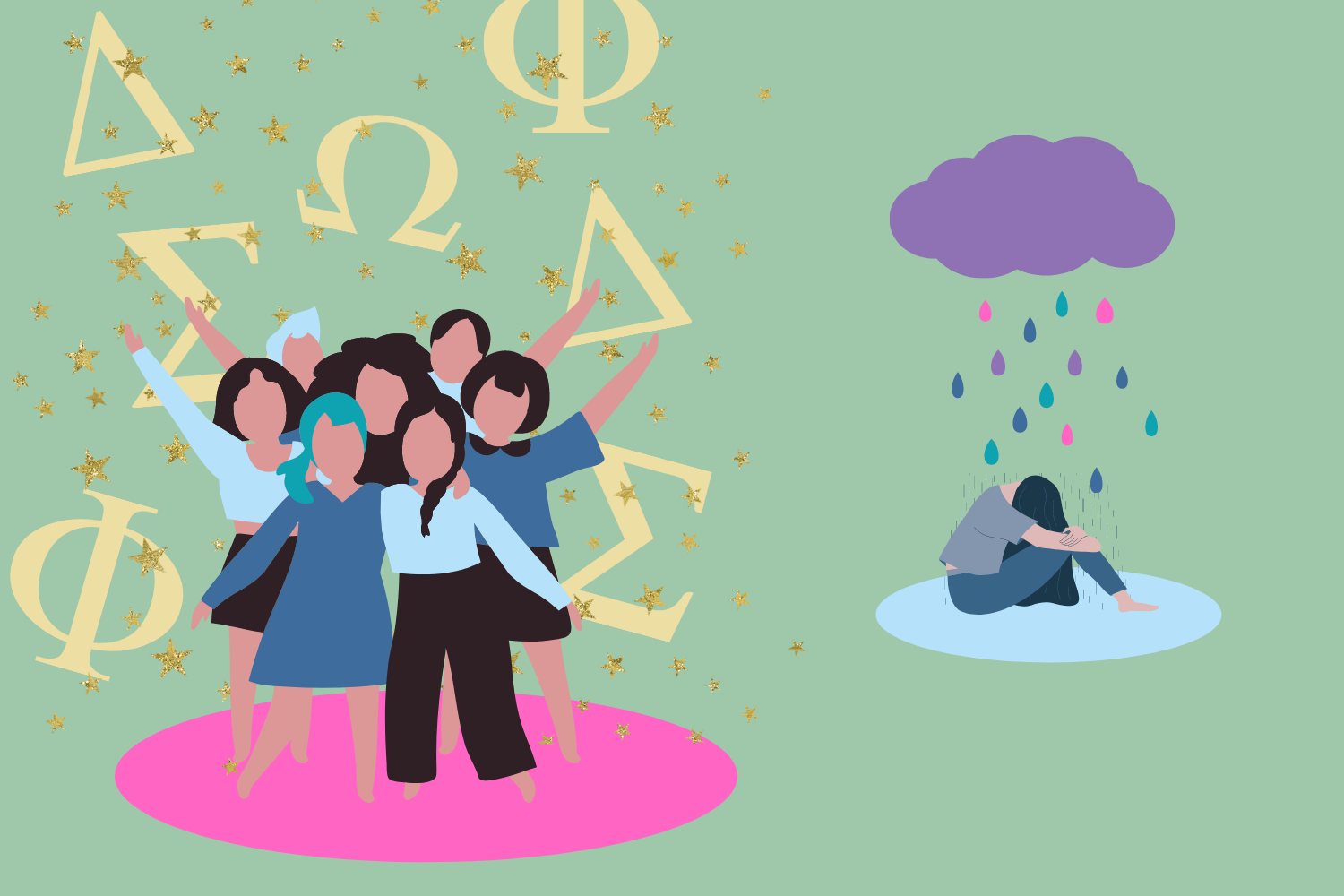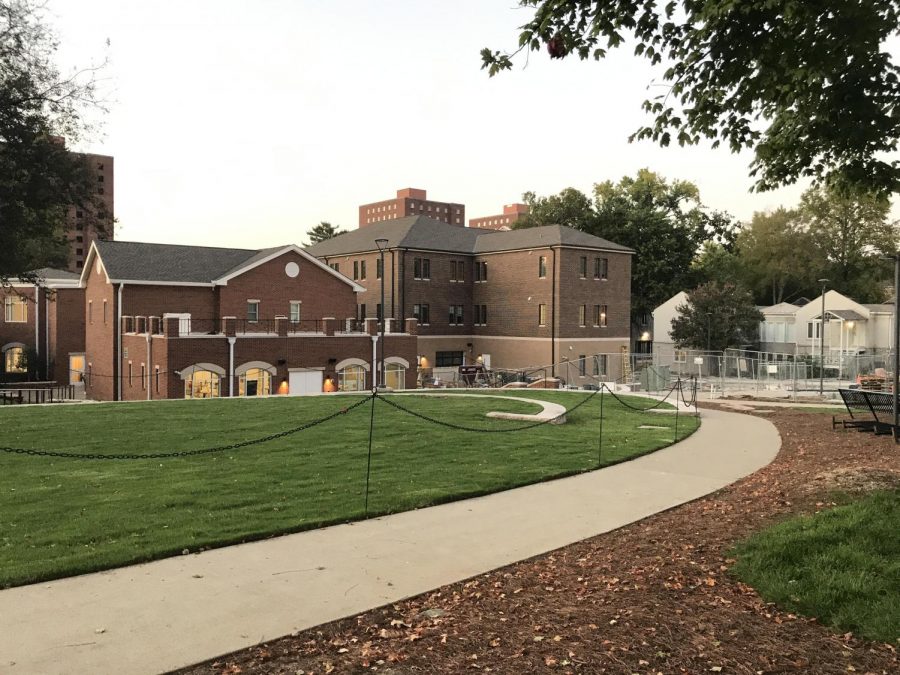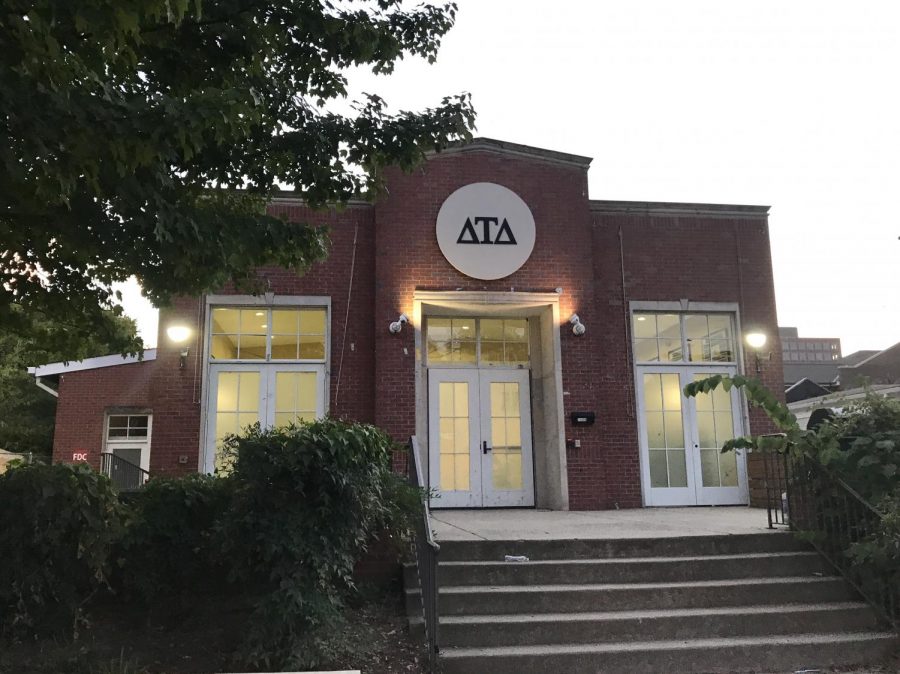I have wanted to be in a sorority for as long as I can remember. As someone who is described as the STEM incarnation of Elle Woods, the girly-girl role was second nature to me. When I came to Vanderbilt, I could not have been more excited to go through Panhellenic rush. I’d heard that one’s first year of college is supposed to be about finding yourself, but I still wasn’t sure exactly who I was. Panhellenic recruitment seemed like the light at the end of the tunnel where I could grow as a person and find my sisters.
The first time I rushed, I was completely ignorant about the process. I had been so focused on my difficult science classes and adjusting to life at college that I hadn’t been making any connections. I had also never experienced “dirty rushing,” a practice in which current sorority members meet up with prospective pledges on the sly. My friends were going out for rush lunches with their future sorority sisters, while I was just trying to pass my organic chemistry class. People assured me that even though I didn’t go for rush lunches, I would be more than fine because I was social and “sorority-girl pretty.”
This assumption that I would be fine because of my physical appearance is damaging. There is a pretty-privilege representation in Greek Life and a looming pressure to always look your best. Wearing your finest outfits for rush and showing off your wealth through designer brands is the standard in person and on social media. This expectation carries quite a financial burden.
I eagerly anticipated the beginning of rush: the weekend of virtual display and philanthropy rounds. I was so pumped, dancing in the Zoom calls and pacing down the hallway in my silky blouse and sweatpants look. Unfortunately, my excitement was short-lived: after testing positive for COVID-19, I was cut from every sorority I had seen myself in. I was so confused and distraught with the outcome; I had considered myself a likable person and prided myself on fitting in with different groups of friends. I questioned my self-image and personality.
I could have been in a sorority, but why join a sisterhood that did not feel like home? Isn’t the whole point of sororities to find people that you feel comfortable around? The ones that felt like home didn’t want me back and never told me why. It hurts not to know why you didn’t make the cutoff, and it makes you worry every day about what you did wrong.
When you rush, you are essentially being judged for your likeability and how well you would fit into a group of friends. If you aren’t chosen, you never get to know why. I couldn’t help but think that if I was better, prettier, more likable, I would have been chosen.
During the fall of my sophomore year, I tried again to find a group I felt I belonged in. Each fall, the Continuous Open Bidding (COB) process starts as a less formal recruitment process, where conversations are less official and chapters can more quickly give you a bid. The promise of a less dramatic, more welcoming rush process seemed almost too good to be true. I felt that having friends already part of Greek Life would give me a leg up. After visiting the houses, I knew people’s names; I felt like I was in an excellent position to get a bid.
But once again, I failed to make the cutoff. Not every house participated in the COB process, and I was left without a bid from any of those participating.
Some of my friends were wildly successful in the COB process—even receiving multiple bids. One of my friends who got a bid had a sudden influx of people who wanted to meet her. Some of these people didn’t even know her before the rush process and wouldn’t even look twice at her when we would go out before the rush process.
The denomination of sister made her worthy of their friendship.
I was left asking myself, “why wasn’t I also worthy of their friendship?” After not receiving a bid, I learned about the importance of dirty rushing and the way in which a potential new member is voted on by a sorority here at Vanderbilt. In some sororities, every member votes to determine whether a prospective new member (PNM) should move to the next round, and some sororities require each person you talk to to give you a score based on the conversation you had. If you’re friends with the people you talked to, you will get higher scores. I was being judged based on who I was friends with, not who I was as a person. The politics behind recruitment seemed appalling to me. One conversation had the ability to control my fate in this whole process.
The process disillusioned me, and I told all of my friends I would never rush again. However, over Thanksgiving break, I decided to register for recruitment proactively in case I changed my mind later. The summer before sophomore year, I moved from my home in New Jersey to Miami. Feeling alone, I decided to get out of my comfort zone and meet new people. I felt comfortable with the new me and gained the confidence that hadn’t quite developed my first year. I decided to follow through with formal recruitment for a second time. I felt that I had missed countless events during my freshman year: mixers, date parties, formals and friendships.
My family encouraged me not to go through this process again because they couldn’t bear to see me unwanted, rejected and in pain yet another time. But despite their wishes, I added “PNM 65” to my Zoom name and was ready to rush for the third time, convinced things would be different.
Saturday morning was the start of the display round. I knew the drill; I had already been through the process twice. I prepared with one of my friends and was warned not to talk about the Three B’s: boys, booze and bills. I was cautioned to police my language, to talk about things the other girls would want to hear, to hide parts of my identity. I can vehemently say that these rush conversations were anything but expected. My first conversation discussed all Three B’s. I didn’t know what my position was and I was unsure if I was being taken seriously. Some chapters focused on my wealth and connections, while others asked dry question after dry question.
Picture this: a girl asks you your major, your town, your favorite Nashville restaurant, your weekend activities and why you are rushing all in the span of a few minutes and then has no follow-up responses. Another girl is on her phone the whole time and makes you repeat a question to her three times because she’s not paying attention. These conversations made me feel like I was not worth these girls’ time.
The morning before Preference Round, I was dropped from all but two sororities, and I did not see myself fitting into either one of them. Every sorority has a mold that you are supposed to fit and I just did not fit. Girls are encouraged to “maximize their options,” which involves being open to a bid from any house. There are amazing girls in every sorority, but for me, this meant being left with options I couldn’t see myself being at home in. Therefore, I dropped before I even made it to Bid Day. Any confidence that I still had left crumbled. How could this have happened for the third time? The process had made me doubt myself as a friend, a daughter, a sister and a woman. Was I not cool enough? Not smart enough? Not pretty enough?
The defeat of the process made me so angry knowing that my opportunity to be friends with any of these girls afterward slipped through my fingers—again. I had connected with quite a few girls and made plans to hang out after recruitment. I haven’t received a message from any one of them thus far. Was I not worthy of friendship without the title of a sister? Beyond friendships, my romantic relationships suffered. Not being in Greek life excluded me from inviting boys to “date parties” and boys did not want to take me to theirs because I couldn’t reciprocate and didn’t hold the “sorority girl” label.
On paper, I fit the stereotypes: I’m blonde, tan and social. The recruitment process drained me and left me questioning my identity and self-worth. I cannot begin to imagine how this process would feel for those who aren’t as privileged.
I’ve come to realize that issues within the Panhellenic system are deep-rooted and that small changes will not be enough to erase stigmas and implicit biases every chapter has.
On my very first day of recruitment, I realized that every house on campus had its own idea of exactly how their sisters should be. More than a year later, it is clear to me now that only a few girls have the luxury to show their true selves. Being yourself is only acceptable when you fit the mold set by others. I am already hurt being known as the token friend who isn’t in Greek Life, but I cannot even fathom the added level of pain and discomfort being referred to as the token “diverse” bid in a sorority would place on someone. Given the lack of diversity and inclusion in Greek Life, is no wonder the Abolish Greek Life (AGL) movement is so prominent on Vanderbilt’s campus.
On Bid Day, I stayed in a totally different building the whole day to avoid seeing the excitement and joy around me. Having to watch all the Instagram posts saying things like “finally home” and “got her” reminded me of exactly what I was missing out on.
I want real reform beyond the surface level elimination of the dress code and subsidizing registration fees. The Vanderbilt Panhellenic Council needs to take action to promote a standardized rush experience for all PNMs regardless of connections, wealth and looks. I suggest making the first two days of formal recruitment mirror informal recruitment with less pressure, fun activities and no dress code. Making rush rounds fun can give PNMs a better understanding of the sororities and promote a better experience for current members.
Every girl should feel empowered and safe going through this process. Every girl should feel that they can be their true selves without judgment and that they will be enough.
Let my abysmal experience serve as a wake-up call that the uncertainty and pain caused by rush are exactly why girls do not rush in the first place and why PNMs drop during the recruitment process. I genuinely hope that my experience brings comfort to those whose confidence was shattered after formal recruitment. I am not a part of the AGL movement, but I am against the Panhellenic rush process as it stands.
Going through this process three times has opened my eyes. It has left me emotionally scarred and made me feel utterly alone. I hope that I can make at least one girl out there feel less alone.
People say that this process should not define you and that you are better than it. While I do not think this process will ultimately define me, I do think that this is one bump in the road and that there will be a silver lining in the end.










Yucky • Jan 2, 2023 at 5:17 pm CST
Honestly, I was on the fence about rushing. Your article helped nudge me toward the “yes” column. If they don’t care about Elle Woods despite her self-proclaimed superficial desirability, then maybe there’s more to it than I thought. This article shows a SHOCKING deficit of self-awareness and abundance of entitlement. Terrible combination, btw. I would be BEGGING them to take it down.
live laugh love • May 4, 2022 at 10:52 pm CDT
thanks for your opinion, white girl! so sorry to hear that you went through this, it sounds traumatizing. you are really making a difference. i hope writing this article raises awareness so other rich blonde white girls like you don’t have to go through the same harrowing experience of having someone not want to be your friend.
fan • Mar 20, 2022 at 3:10 pm CDT
You are truly an inspiration
Close-minded • Feb 18, 2022 at 4:34 pm CST
There’s a lot that is just flawed, close-minded thinking in this article. I’m sorry you had a bad experience but you’re hitting all the wrong points about why Greek Life is problematic.
If you were accepted into one of your top sororities, would you even be writing this article right now? I think that’s the biggest insight on how petty this article comes off.
I’m not in Greek Life, so this may be incorrect. But what I’ve known about Greek Life, at least on Vandy, is that it’s not what you’re saying it to be. I had a roommate freshman year who went through the rush process early on, didn’t have much experience with Greek Life. Just came as her full-self; she wasn’t super fashionable or had blonde hair or any of that. And she got into the sorority she liked most.
So what you’re saying about Greek Life being super exclusive and difficult for newbies to really enter without connections sounds pretty different from what I’ve observed. Maybe it’s like that in other schools but what I’ve seen of Vandy Greek Life, it didn’t seem that way.
In addition, as a student who’s not in Greek Life, I can definitely tell you that you don’t need to be in a sorority/fraternity to “belong”. If your supposed friends are ditching you because you’re not in Greek Life, you honestly need to get some new friends.
We have such an amazing assortment of organisations across campus. You can find practically anything you’re interested in. Many of the clubs are also super open to anyone, even if they’re niche like a cultural club or a sports club.
It also rubs me the wrong way that you complain about not being accepted by any sororities, then talk about how two were interested but you dropped before the process was done because you “didn’t think they were a fit”. You haven’t even been in the sorority yet, and you clearly are desperate to be part of Greek Life. Why not give those sororities a shot?
You speak as though you are so alone, questioning your identity because no one wants you. But you’re the one not even giving other people a chance either, whether it was those two sororities or other non Greek Life campus involvements. I suggest you at least try other options before complaining about Greek Life, because you just come off as entitled and bratty.
This is so offensive • Feb 16, 2022 at 9:39 pm CST
“I am already hurt being known as the token friend who isn’t in Greek Life, but I cannot even fathom the added level of pain and discomfort being referred to as the token “diverse” bid in a sorority would place on someone” (Dresner).
I genuinely find this incredibly offensive. Please please please do not compare your experience of not being in Greek Life to being a POC in Greek Life or at Vanderbilt. It genuinely hurts me to read this as it suggests that the painful experiences of POC feeling the like the “token” POC member is some how the same thing or even on the same level as you not being in Greek Life. Is your core identity, something you can’t change, the only thing people see so much that it undermines who you actually are?
I really hope you learn from these comments and check your privilege. It must be really hard being seen as a “blonde, tan, and social” “sorority-girl pretty” person. That sucks.
privileged • Feb 15, 2022 at 9:20 pm CST
damn, ironic you complain about bias and judgment but you think being pretty, tan and rich is gonna you everywhere. it speaks volumes on the privileges you’ve had when you want to get rewarded for just being pretty. you really tried to speak on the toxicity of greek life when they didn’t accept you, but i would assume you’d be perfectly fine in joining them if they had accepted you. an example of how white mediocracy is rewarded. don’t pretend to know the actual struggles poc face in elite schools like this.so do not compare yourself for the love of god. plus you seem to be full of yourself, miss “elle woods” reincarnation
Very angry • Feb 15, 2022 at 8:30 pm CST
This is actually the most ridiculous piece of writing I have seen in a long time. Truly, wtf? According to you, you are white, blonde, pretty, social, and rich, so you should be in a top sorority right? But that didn’t happen (three times), so the system must be messed up. There are a million problems in Greek life and literally maybe one of them has to do with your experience. Your richness and whiteness entitled you to Greek life and that is the problem- sorry white supremacy didn’t work out for you this time. I know you are just a kid, so I am sorry that you have felt excluded and hurt; I know this is tough and about to get worse, but this piece is actually so incredibly disrespectful to individuals who are constantly marginalized by Vanderbilt and, like, all of society. This piece is violent and embarrassing, and I hope you seriously consider all the feedback and use this an opportunity to learn and grow.
missed the mark • Feb 15, 2022 at 7:13 pm CST
If you want to make commentary on sororities/greek life, i suggest you consider the more deep-rooted issues in the system. Discrimination against POC and the LGBT+ community, unethical morals and practices, rampant sexism, perpetuation of hazing culture— all of which are more salient arguments for bettering panhel. Such an article, written from the perspective of a physically desirable candidate (as you remind us so many times throughout), detracts from others who have endured much worse. If you’re not open to be judged on first impressions and likability, don’t rush an organization that is founded on those ideals.
Self-Awareness Sheesh • Feb 15, 2022 at 2:11 pm CST
I wonder if Hannah would feel this way if being “pretty and blond” had been enough to land her a bid from one of the sororities she wanted. It’s a shame the others weren’t good enough for you.
I think you’d benefit from some self-reflection, Hannah.
I don’t have much sympathy here.
Problematic • Feb 15, 2022 at 10:40 am CST
Honestly this feels pretty problematic. I see where the author is coming from but the angle she went about it is all wrong. Claiming you didn’t think you’d fit in with the houses you were left with is a cop out statement PNMs make when they get cut from “conventionally cool” sororities. Elitism runs as deeply in (some of) the girls who rush as it does in the houses. Also don’t compare your experience to POC. Not okay to do that especially when you’re constantly reminding the reader throughout your article of your stereotypical look and wealthy background. Being rich and “blonde tan and pretty” doesn’t mean you’re entitled what you want, so perhaps it’s best you learned this lesson now and the hard way. Completely missed the point on this one.
Panhel, you should do better. • Feb 15, 2022 at 9:08 am CST
I think that people are missing the main point of the article, and that is that the entire Panhellenic rush process is very messed up. For many people, if you don’t know any upperclassmen before hand then you are judged on a 5-10 minute conversation in which Panhel requires that you be voted on in order to rank the girls wanted back. For anyone who has social anxiety or is shy or unconnected then display round ultimately screws you over. Additionally, if someone in house doesn’t like you, they can privately submit forms that can prevent you from entering the house. That is one person can block you. The recruitment needs a lot of reform, and encouraging sororities to host more frequent causal events will decrease the likelihood of every event being planned to the tee, and pnms feeling stressed to impress. I love the community I have found inside my sorority, but the rush process and the way panhel perpetuates it by putting so many regulations on what you can/can’t do or can/can’t say left me feeling horrible for how it made girls feel. The pre rush regulations may prevent some occurrences of dirty rushing but ultimately they prevent friendships from forming deep enough to last post recruitment.
Anonymous • Feb 15, 2022 at 12:24 am CST
I wonder if her last two houses were not pretty, cool, or smart enough for her…
“elle woods” • Feb 15, 2022 at 12:22 am CST
“The process had made me doubt myself as a friend, a daughter, a sister, and a woman”. I think this might be a you problem. You are placing your entire self-worth into your sorority experience which was your first mistake. While greek life as a whole is plagued with problems, this experience is not one of them.
Anon • Feb 14, 2022 at 9:52 pm CST
You decided to drop because you didn’t see yourself fitting into the two houses that wanted you, yet you’re offended that other houses that dropped you used that exact same logic. Why is it okay for you to make the determination of fit, but not them? This piece would have been more meaningful had you given one of those houses a chance.
... • Feb 14, 2022 at 7:41 pm CST
I think you highlight some of the problems of Panhel recruiting with its elitism, but it also sounds like you hold yourself above plenty of girls who are in the sororities you rejected. Kinda double standards
Sydney • Feb 14, 2022 at 5:53 pm CST
you are not advocating for substantive change but rather moving goalposts so you a pretty white girl can get into a sorority you want. Please get over urself
Thoughts • Feb 14, 2022 at 5:15 pm CST
I think hannah unintentionally brings up a somewhat niche point. There are limited community offerings on this campus for normal straight white peoples who want things like date parties and formals, but aren’t slick enough for the best/mid frats/sororities, but aren’t weird enough for the weird srats/frats. These people can’t join cultural orgs and res colleges don’t bring about that real community they want. For white conscientious objectors to Greek life, there are limited fun social life offerings. Though she sort of unintentionally finds herself in this position, and only raises objections to Greek life due to her own shortcomings in the rush process, hannah now finds herself excluded in the campus community. I suspect there are more people relating to this feeling of exclusion
Self-Awareness Sheesh • Feb 15, 2022 at 2:08 pm CST
Ah, the old white people are being oppressed by white institutions, join a club or an org, dawg. You gon be alright
huh? • Feb 15, 2022 at 6:49 pm CST
most social events have a greater presence of straight white people than any other demographic (easily). if you’re referring to parties thrown by cultural student orgs like the SACE or ASU, you are most definitely allowed to come, they advertise them everywhere to everyone… and if you feel uncomfortable around BIPOC people (???), there will be straight white people there for you to hang with, I promise
missed the mark • Feb 16, 2022 at 11:36 am CST
While this side of recruitment/sorority life is not ideal, I don’t think colleges should be prioritizing their efforts to better cater the straight white people on this campus. I think they have done that plenty enough. If straight white people are struggling this much to find friends/a community, then maybe the blame lies within the individual and not with the hundreds of people that make up these groups.
Anon • Feb 14, 2022 at 4:42 pm CST
I am having a hard time feeling sorry for you. You had the option of being in a sorority but you felt like it wasn’t your “home” so you rejected it. That was YOUR choice. You rejected these other women who wanted you and didn’t give them a chance while whining that you were rejected by the people you thought you belonged with. Your behavior is no different than the any of the sororities who dropped you.
Yes it sucks to be not wanted. But life is not guaranteed to give you everything you want just because you think you should have it. Will you write an op-ed when you don’t get the internship you think you deserve? Or get into the grad school you think you should be admitted to?
Frat Dude • Feb 14, 2022 at 3:16 pm CST
The most agreeable part of this article is avoiding sorority bid day.
anon • Feb 14, 2022 at 1:13 pm CST
i’m sorry that you had a negative experience with panhel, but the way that you paint yourself as the sole victim of panhellenic orgs because you feel like you were entitled to a bid is so invalidating to other women and people who have been actively discriminated against and been sexually and emotionally exploited within those orgs… if you’re going to criticize greek life maybe touch on those issues instead of complaining about how your whiteness and blondeness weren’t enough to get a bid from a house u liked lol
anon • Feb 14, 2022 at 11:45 am CST
all this article does is prove that you cant just demand your way into the sorority you want because ur rich tan and conventionally pretty
hmmm... • Feb 14, 2022 at 10:57 am CST
It seems like the author should be AGL. You have experienced one tiny part of the reason that so many people on campus feel unwelcome in greek life. For others it is because of the racism that exists within these orgs (which is historic and well documented) or their financial exclusivity and gendered exclusivity or their general exclusivity. The argument here should have been “As a privileged person, my experience was horrible and I can’t imagine being a person of a marginalized identity because they would have had it so much worse during this process” A system that only works for tan pretty rich white girls is not a system I am comfortable supporting on my college campus. You are so right that everyone deserves to have a community on campus, but because greek life denies that to so many people and has for decades, it seems like you are so close to realizing why so many people are AGL.
Common Sense • Feb 14, 2022 at 1:11 pm CST
“Financial exclusivity” – chapters providing need based scholarships as well as the IFC
“Gendered exclusivity” – yes like that point is to be separated by male and female
“Racism” – its easy to say Greek life isn’t diverse when u have orgs like NPHC directly competing with IFC and Panhel. If u really wanted to discuss diversity, then u should also acknowledge that NPHC is significantly less diverse than IFC or panhel. While being involved in the rush process, I also have never seen anyone have a lower chance at recruitment because of their race and would be absolutely appalled if I heard of anything like that.
Instead of trying to pin others w awful names like “racist”, “sexist”, “homophobe” whatever, just for being in Greek life, maybe consider maybe that people just didn’t like u as a person and that’s y u didn’t get a bid. But it’s ok, ik it’s too hard for u to put the blame on urself, so instead continue pushing AGL where u can spread false truths and hate because of ur bitterness.
anonymous • Feb 15, 2022 at 6:00 pm CST
please don’t bring us into this we don’t want her
Ur mom • Feb 14, 2022 at 10:26 am CST
Are u kidding me? Check ur privilege. Just bc u didn’t get into a sorority u wanted, we’re supposed to feel sorry for u? Everyone deals w their problems and some of them r a lot worse than this.
Emmy • Feb 14, 2022 at 6:56 am CST
thank you so much for sharing, Hannah!!
Meghan Pincowski • Feb 13, 2022 at 11:41 pm CST
Not sure that being “blonde, tan, and social” are requirements for chapters here, maybe a meaningful conversation with a sister would have helped more than focusing on the stereotypes that you or the houses should fit into. Most PNMs don’t get their first choice house, but if they keep an open mind, they can create meaningful relationships in any of the 9 houses